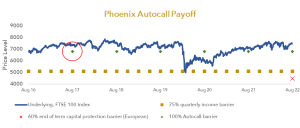With inflation being at levels investors haven’t seen in forty years, and many investors seeking to preserve their capital whilst sustaining an income in this volatile, uncertain environment; traditional asset classes such as bonds are looking less attractive.
A combination of uncertainty and rising interest rates means that whilst the likely short-term decision might be to reduce their portfolio’s weighting towards bonds; the question is where should the investor move this allocation? An asset class which is certainly worth exploring is structured products, and more precisely, income paying structured products.
What is an income paying structured product?
Income paying structured products are financial instruments that can offer competitive levels of income, without compromising investor’s capital in a depressed market. Like other structured products, their performance is linked to the performance of their chosen underlying investment ‘the underlying’. The underlying can be for example a stock market index, a stock, or a basket of stocks.
The most common income paying structures
The most common structure is known as a ‘Phoenix’ payoff. This offers investors income (or yield) over a certain period as long as the underlying is above a specific pre-determined price level known as the income barrier. For example, a product will pay income on a quarterly basis over 6-years if the underlying investment is at or above 75% of the initial price level of the underlying on each quarterly observation date. This type of income paying structured product often includes a memory and autocall feature.
What is a memory feature? A memory feature enables investors to recapture any income payments that have been missed due to the underlying not meeting the pre-set price level, in the event that the price of the underlying recovers.
What is an autocall feature? An autocall is a feature which can trigger early maturity of the product, returning the investors’ principal in full if the underlying is at or above a pre-determined price level known as the autocall barrier.
The dates used to review the price level of the underlying for autocall purposes is not always the same as the dates used to review the price levels for income payments. For example, income could be paid quarterly, whilst the product may only have the opportunity to autocall annually.
How does a Phoenix Autocall payoff work?
An example of a Phoenix payoff is shown in the diagram below. On this example, the product would mature on the first autocall observation, after four quarterly income payments being made to the investor.

Source: Bloomberg 25.08.2016 – 25.08.2022
It must be noted that income paying structured products are capital-at-risk products. This means that if at the end of a product’s term the price of the underlying is below a pre-set capital protection barrier, for example, if the price level of the underlying falls beneath 65% of the initial level, the investor will not receive all their capital back, it will be reduced on a 1 to 1 basis with the performance of the underlying. However, if the price of the underlying is above the pre-set capital protection barrier, the initial capital amount invested is returned to the investor in full upon product maturity.
The other structure which is coming back into fold due to improving interest rates along with higher volatility is the ‘Reverse Convertible’ payoff. This structure offers the investor a fixed level of income, irrespective of the performance of an underlying, subject to the continued solvency of the counterparty issuing the investment.
How are income paying structured products priced?
The key components which determine how income paying structured products price are:
-Dividend yield of the underlying
-Interest rates
-Implied volatility of the underlying
The ideal condition for income paying structured products is a volatile underlying, with a high dividend yield, in a high interest rate environment. This means that the current rising interest rates are certainly making these products more appealing to the investor.
Why would you invest in an income paying structured product?
Income paying structured products can be attractive for investors who are looking for high levels of income and can accept some risk to the invested capital. These products allow investors to take advantage of higher market volatility to receive a pre-determined yield that is inaccessible through traditional fixed income securities, whilst protecting the initial capital from poor market conditions. However, the investor is exposed to the risk of a significantly large decline in the price of the underlying. Whilst this risk is not to be underestimated, the upsides of a competitive yield that is locked in over multiple years is certainly worth exploring as part of a wider portfolio.
If you want to know more about income paying structured products offered by Causeway Securities, visit our website and register to access our Portal to receive our weekly newsletter and up to date information about the latest products open for investment.
Important Information
This publication is intended to be Causeway Securities Limited own commentary on markets. It is not investment research and should not be construed as an offer or solicitation to buy, sell or trade in any of the investments, sectors or asset classes mentioned. The value of any investment and the income arising from it is not guaranteed and can fall as well as rise, so that you may not get back the amount you originally invested. Past performance is not a reliable indicator of future results. Movements in exchange rates can have an adverse effect on the value, price or income of any non-sterling denominated investment. Nothing in this document constitutes advice to undertake a transaction, and if you require professional advice you should contact your financial adviser.
Causeway Securities Limited is authorised and regulated by the Financial Conduct Authority. (FCA FRN 749440). Causeway Securities Limited is registered in England and Wales with company number 10102661. Registered address 2nd Floor 1 – 2 Broadgate Circle, London, England, EC2M 2QS.
 PORTAL LOGIN
PORTAL LOGIN